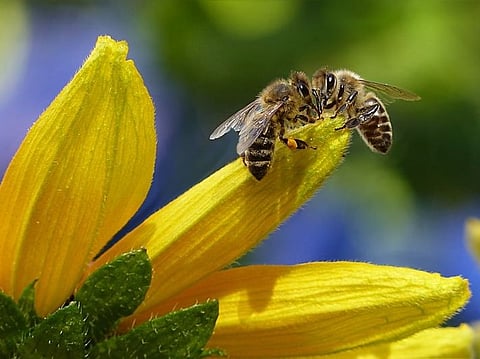Sunjay Kapur death: What UAE residents must know about bee stings
Experts note accidentally swallowing a bee can have serious, sometimes fatal, consequences

Dubai: The sudden passing of Indian industrialist Sunjay Kapur, the ex-husband of actor Karisma Kapoor, during a polo match in the UK has sparked global interest, not only because of his celebrity stature but also due to the widely reported unusual cause: a bee allegedly flying into his mouth, triggering a fatal chain of events.
Though postmortem reports are awaited and it remains uncertain whether he swallowed a bee, experts have warned that a bee sting can prove fatal. They note that such an incident could happen to anyone – while walking in parks or streets, enjoying a day at the beach, horse riding, or hiking. Medical experts explain how to stay prepared for insect stings or bites during outdoor activities.
How to make informed decisions
Dr Vikram Singh, Specialist Cardiologist at Aster Clinic, Dubai Silicon Oasis, noted that while accidentally swallowing an insect, such as a bee, may seem harmless, it can in rare cases lead to serious complications, including severe allergic reactions, respiratory distress, or even cardiac arrest and heart attack.
“While the scenario is unusual, understanding the physiology and pathophysiology involved can help in identifying potential risks, recognising early signs of severe reactions, and responding appropriately.”
Physiology of swallowing an insect
According to Dr Singh, when a person swallows an insect, it usually travels down the oesophagus and into the stomach, where it is digested without causing harm. However, the situation becomes critical if the insect stings during the swallowing process, especially if the sting occurs in the throat or airway.
“If an insect like a bee stings the delicate mucosal surfaces of the throat or the upper airways, it can cause immediate local reactions such as swelling, pain, and difficulty breathing. These reactions are often a direct result of the venom injected by the bee's sting.”
Risks for individuals with insect-venom allergies
“While uncommon, accidentally swallowing a bee can precipitate life‑threatening events such as anaphylactic shock, cardiac arrest, or even myocardial infarction (heart attack), particularly in those with severe insect‑venom allergies,” noted Dr Yassen Hadi Challoob Alogaidi, Specialist Cardiologist (Heart Care) at Prime Medical Center, King Faisal Road, Sharjah.
“Moreover, even non‑allergic individuals may suffer sudden airway swelling and obstruction if stung on the tongue, throat, or larynx. Case reports have also documented direct cardiotoxic effects of bee venom such as coronary vasospasm or endothelial injury leading to myocardial infarction,” Dr Alogaidi said.
Understanding anaphylactic shock, airway obstruction
Anaphylactic shock: When bee venom enters the bloodstream, it can trigger a cascade of immune responses, releasing histamines and other chemicals that cause blood vessels to dilate. This leads to a sudden drop in blood pressure (anaphylactic shock). If the airway swells, oxygen levels drop, potentially causing cardiac arrest due to hypoxia.
Airway obstruction: A sting in the throat or airway can cause severe swelling, obstructing airflow. This may lead to respiratory distress and oxygen deprivation, which can result in cardiac arrest if not treated promptly.
Who is at risk?
Certain individuals face a higher risk of severe reactions:
Those with a history of anaphylaxis to insect stings or bites,
People with asthma or other respiratory conditions,
Children and the elderly, due to more vulnerable immune systems,
Individuals allergic to bee venom, even without prior exposure.
Early signs of severe allergic reactions
Prompt recognition of symptoms is critical. Warning signs may appear within minutes and include:
Swelling or redness around the mouth or throat,
Difficulty swallowing or speaking,
Shortness of breath or wheezing,
Rash or hives on the skin,
Dizziness or fainting,
Chest pain or tightness,
Confusion or loss of consciousness.
What to do in an emergency?
If someone swallows a bee and shows signs of a severe reaction:
Call emergency services immediately,
Administer an epinephrine auto-injector (EpiPen) if available,
Keep the person upright if breathing is difficult,
Do not give food or drink,
Monitor breathing and consciousness,
Be prepared to perform CPR if needed and trained.
Precautions to avoid such incidents
While rare, swallowing an insect can happen during outdoor activities. To reduce risk:
Avoid eating or drinking near flowering plants or insect-prone areas,
Keep food and drinks covered outdoors,
Wear long sleeves, pants, and closed shoes in nature-heavy areas,
Steer clear of hives or nests,
Carry a first aid kit with antihistamines and an EpiPen if you have a known allergy.



